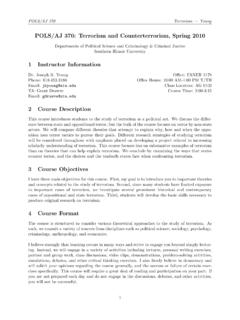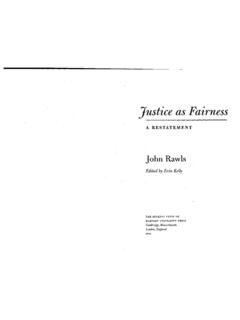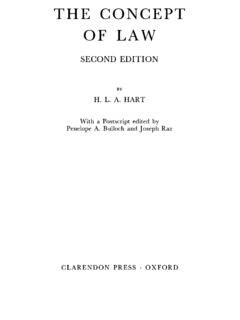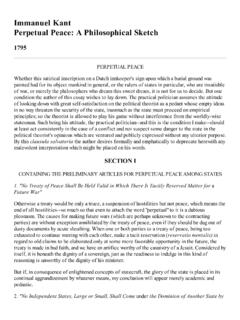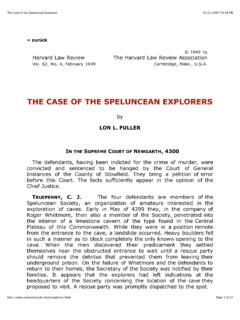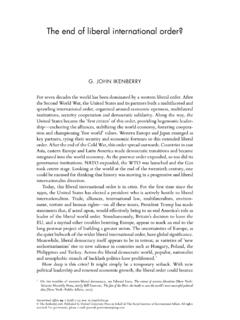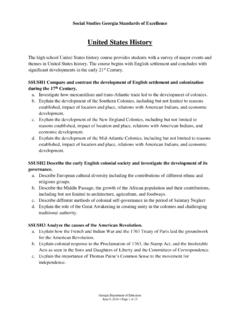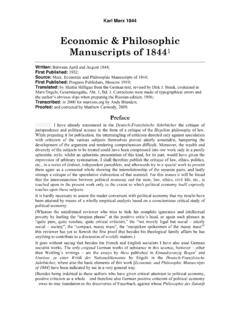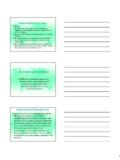Transcription of The German Ideology
1 The German IdeologyWorks of Marx and Engels 1845 The German IdeologyCritique of Modern German Philosophy According to Its Representatives Feuerbach, B. Bauer and Stirner, and of German Socialism According to Its Various Prophets[7]Written: Fall 1845 to mid-1846;First Published: 1932 (in full);Preface: from Marx-Engels Collected Works, Volume 5. Volume ICritique of Modern German Philosophy According to Its (1 of 3) [3/31/2006 4:18:09 PM]The German IdeologyFeuerbach, B. Bauer and Stirner[8]Preface I. Feuerbach: Opposition of the Materialist and Idealist Outlooks II. The Leipzig Council: Saint Bruno III. The Leipzig Council: Saint Max [45](Abstract of Chapter III) Volume IICritique of German Socialism According to Its Various ProphetsTrue Socialism Highlights of The German Ideology Image of page from the chapter "Saint Max"1840s Index | Works | Famous Quotes | (2 of 3) [3/31/2006 4:18:09 PM]The German IdeologyMarx-Engels Archive (3 of 3) [3/31/2006 4:18:09 PM]The German IdeologyKarl MarxThe German IdeologyPrefaceHitherto men have constantly made up for themselves false conceptions about themselves, about what they are and what they ought to be.
2 They have arranged their relationships according to their ideas of God, of normal man, etc. The phantoms of their brains have got out of their hands. They, the creators, have bowed down before their creations. Let us liberate them from the chimeras, the ideas, dogmas, imaginary beings under the yoke of which they are pining away. Let us revolt against the rule of thoughts. Let us teach men, says one, to exchange these imaginations for thoughts which correspond to the essence of man; says the second, to take up a critical attitude to them; says the third, to knock them out of their heads; and -- existing reality will collapse. These innocent and childlike fancies are the kernel of the modern Young-Hegelian philosophy, which not only is received by the German public with horror and awe, but is announced by our philosophic heroes with the solemn consciousness of its cataclysmic dangerousness and criminal ruthlessness.
3 The first volume of the present publication has the aim of uncloaking these sheep, who take themselves and are taken for wolves; of showing how their bleating merely imitates in a philosophic form the conceptions of the German middle class; how the (1 of 2) [3/31/2006 4:18:10 PM]The German Ideologyboasting of these philosophic commentators only mirrors the wretchedness of the real conditions in Germany. It is its aim to debunk and discredit the philosophic struggle with the shadows of reality, which appeals to the dreamy and muddled German nation. Once upon a time a valiant fellow had the idea that men were drowned in water only because they were possessed with the idea of gravity. If they were to knock this notion out of their heads, say by stating it to be a superstition, a religious concept, they would be sublimely proof against any danger from water.
4 His whole life long he fought against the illusion of gravity, of whose harmful results all statistic brought him new and manifold evidence. This valiant fellow was the type of the new revolutionary philosophers in Germany. Next Section Table of Contents for The German Ideology Marx-Engels Archive (2 of 2) [3/31/2006 4:18:10 PM]The German Ideology : Chapter 1 - On FeuerbachMarx/Engels Internet Archive Chapter I: A Critique of The German Ideology Written: Fall 1845 to mid-1846 First Published: 1932 (in full) Source: Progress Publishers, 1968 Language: German Transcription: Tim Delaney, Bob Schwartz, Brian Basgen Online Version: Marx/Engels Internet Archive ( ) 2000 Preface I. Feuerbach: Opposition of the Materialist and Idealist Outlooks A.
5 Idealism and Materialism The Illusions of German Ideology First Premises of the Materialist Method History: Fundamental Conditions Private Property and communism (1 of 2) [3/31/2006 4:18:10 PM]The German Ideology : Chapter 1 - On FeuerbachB. The Illusion of the Epoch Civil Society and the Conception of History Feuerbach: Philosophic, and Real, Liberation Ruling Class and Ruling Ideas C. The Real Basis of Ideology Division of Labor: Town and Country The Rise of Manufacturing The Relation of State and Law to Property D. Proletarians and communism Individuals, Class, and Community Forms of Intercourse Conquest Contradictions of Big Industry: Revolution Study Guide for Chapter IImage of page from the chapter "Feuerbach", another and Marx/Engels Works Archive (2 of 2) [3/31/2006 4:18:10 PM]The German Ideology by Marx and Engels The German Ideology by Marx and EngelsThe Leipzig Council [37]ISource MECW Volume 5, pp 94-116 Written: November 1845 April 1846;First published: 1921;Transcribed by: Andy the third volume of the Wigand sche Vierteljahrsschrift for 1845 the battle of the Huns, prophetically portrayed by Kaulbach,[38] actually takes place.
6 The spirits of the slain, whose fury is not appeased even in death, raise a hue and cry, which sounds like the thunder of battles and war-cries, the clatter of swords, shields and iron waggons. But it is not a battle over earthly things. The holy war is being waged not over protective tariffs, the constitution, potato blight, [38] banking affairs and railways, but in the name of the most sacred interests of the spirit, in the name of substance , self-consciousness , criticism; , the unique and the true man . We are attending a council of church fathers. As these church fathers are the last specimens of their kind, and as here, it is to be hoped, the cause of the Most High, alias the Absolute, is being pleaded for the last time, it is worth while taking a verbatim report of the (1 of 36) [3/31/2006 4:18:13 PM]The German Ideology by Marx and Engels Here, first of all, is Saint Bruno, who is easily recognised by his stick ( become sensuousness, become a stick , Wigand, p.)
7 130). His head is crowned with a halo of pure criticism and, full of contempt for the world, he wraps himself in his self-consciousness . He has ,smashed religion in its entirety and the state in its manifestations (p. 138), by violating the concept of substance in the name of the most high self-consciousness. The ruins of the church and debris of the state lie at his feet, while his glance strikes clown the masses into the dust. He is like God, he has neither father nor mother, he is his own creation, his own product (p. 136). In short, he is the Napoleon of the spirit, in spirit he is Napoleon . His spiritual exercises consist in constantly examining himself, and in this self-examination he finds the impulse to self-determination (p.
8 136); as a result of such wearisome self-recording he has obviously become emaciated. Besides examining himself from time to time he examines also, as we shall see, the Westph lische him stands Saint Max, whose services to the Kingdom of God consist in asserting that he has established and proved on approximately 600 printed pages [Der Einzige und sein Eigenthum] his identity, that he is not just anyone, not some Tom, Dick or Harry , but precisely Saint Max and no other. About his halo and other marks of distinction only one thing can be said: that they are his object and thereby his property , that they are unique and incomparable and that they are inexpressible (p. 148).c He is simultaneously the phrase and the owner of the phrase , simultaneously Sancho Panza and Don Quixote.
9 His ascetic exercises consist of sour thoughts about (2 of 36) [3/31/2006 4:18:13 PM]The German Ideology by Marx and Engels thoughtlessness, of considerations throughout many pages about inconsiderateness and of the sanctification of unholiness. Incidentally, there is no need for us to elaborate on his virtues, for concerning all the qualities ascribed to him even if there were more of them than the. names of God among the Muslims he is in the habit of saying: I am all this and something more, 1 am the all of this nothing and the nothing of this all. He is favourably distinguished from his gloomy rival in possessing a certain solemn light-heartedness and from time to time he interrupts his serious ponderings with a critical hurrah.
10 These two grand masters of the Holy Inquisition summon the heretic Feuerbach, who has to defend himself against the grave charge of gnosticism. The heretic Feuerbach, thunders Saint Bruno, is in possession of hyle, substance, and refuses to hand it over lest my infinite self-consciousness be reflected in it. Self-consciousness has to wander like a ghost until it has taken back into itself all things which arise from it and flow into it. It has already swallowed the whole world, except for this hyle, substance, which the gnostic Feuerbach keeps under lock and key and refuses to hand Max accuses the gnostic of doubting the dogma revealed by the mouth of Saint Max himself, the dogma that every goose, every dog, every horse is the perfect, or, if one prefers the superlative degree, the most perfect, man.



